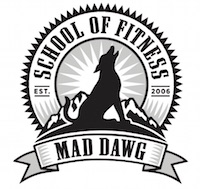For every exercise that we use in our program, there are two components. The first component is what most people think of when they think fitness, when we train an exercise, we are looking for some sort of organic changes, i.e. if we could look at your muscles or bones in a microscope after 12 weeks of training, we would see a change in that tissue or bone. The second component we are looking for are neurological changes. When we practice an exercise, we are looking to see if you really “own” the movement. At MDSoF, we believe that both your physical capacity and the quality of your movement contribute equally to both your short-term fitness gains and your long-term health.
On the spectrum of squats, the box squat is at one end, using mostly the posterior chain, i.e. the muscles that comprise a chain from the bottom of your foot to the back of your head, and the front squat is at the other end, using mostly the anterior chain. While both squats use both the front and back of the leg, specifically, we train the box squat to target the posterior chain. In addition, we practice the box squat because it is a great test of a neutral spine. Here’s the deal, if the movement isn’t correct, you won’t be gaining capacity in the areas that our programming is planning for gains.
We are about half way through this 3 week cycle and I’ve noticed that sometimes our athletes let their knees go forward when they are challenged near the end of their reps. While this video pertains to the box squat, the knees shifting forward can happen in all squats and is the primary cause of knee pain during squats in many of our athletes. In particular, when you are starting box squats, take the time to add some height to the box and/or go lighter for your first sets so that you can re-teach your body the movement. Don’t sacrifice movement for load.
If you want some additional info on the box squat check out this short video on narrated by Louie Simmons. There is also a longer video series called So You Think You Can Squat, which is pretty detailed but also very good. Somewhat longer discussion of box squats by Mark Bell, but still valuable.
